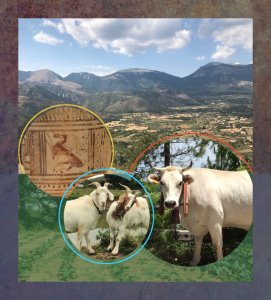Presented By: Classical Studies
Communities, Rural Economies, and Diet in Bronze Age and Iron Age Greece
Gerald F. Else Lecture in the Humanities - Presented by Lin Foxhall

Traditional accounts of the transition from Bronze Age to Iron Age in Greece identified a considerable drop in population after the demise of the palaces (around 1200/1150 BCE) followed, it was argued, by less arable farming, which led to a 'pastoral economy' in the early Iron Age. This picture was believed to be supported by the high value placed on livestock and near-eating in Homeric epic. While this view has recently changed among specialists, many outdated elements remain embedded in current scholarship. Debates over climate change's role in the disruptions that took place at this time also sometimes reflect these old, inaccurate narratives.
This lecture deploys archaeobotanical evidence and stable isotope analysis to demonstrate that in the Greek Iron Age, people continued to depend on plant-based diets supplemented by some meat and dairy. Although, expectably, there is considerable regional variation, relatively small-scale mixed farming agrarian regimes predominated during the Iron Age. It is evident that people in the Iron Age did not adopt pastoral lifestyles, keep more animals, or increase meat consumption. Instead, the data demonstrate the longevity of 'the Mediterranean diet' in its many variations and reveals some of the values people had over the long term attached to food.
Lin Foxhall is a Rathbone Professor of Ancient History and Classical Archaeology at the University of Liverpool. She also serves as Editor of the Journal of Hellenic Studies (Cambridge University Press). Previously she was Dean of the School of Histories, Languages and Cultures at Liverpool and led the University-wide Heritage Research Theme, Professor of Greek Archaeology and History at the University of Leicester, and Head of the School of Archaeology and Ancient History, where she played a significant role leading the team that discovered the body of King Richard III. She has held posts at St Hilda’s College, Oxford, and University College London, and Visiting Professorships in Germany, Denmark, and the USA. She studied at Bryn Mawr College, the University of Pennsylvania, and the University of Liverpool, England.
An active field archaeologist, Lin has led and participated in collaborative research projects in Greece and Southern Italy. She has written extensively on agriculture, rural economies, landscapes, land use, material culture, and gender in the ancient Mediterranean, especially the Greek world, focusing on the time between the Bronze Age and Classical periods.
If you can't join us in person, join us online. This event will be streamed live on March 23 at 4:00 pm: https://www.youtube.com/watch?v=B7bZVDiI0wk
This lecture deploys archaeobotanical evidence and stable isotope analysis to demonstrate that in the Greek Iron Age, people continued to depend on plant-based diets supplemented by some meat and dairy. Although, expectably, there is considerable regional variation, relatively small-scale mixed farming agrarian regimes predominated during the Iron Age. It is evident that people in the Iron Age did not adopt pastoral lifestyles, keep more animals, or increase meat consumption. Instead, the data demonstrate the longevity of 'the Mediterranean diet' in its many variations and reveals some of the values people had over the long term attached to food.
Lin Foxhall is a Rathbone Professor of Ancient History and Classical Archaeology at the University of Liverpool. She also serves as Editor of the Journal of Hellenic Studies (Cambridge University Press). Previously she was Dean of the School of Histories, Languages and Cultures at Liverpool and led the University-wide Heritage Research Theme, Professor of Greek Archaeology and History at the University of Leicester, and Head of the School of Archaeology and Ancient History, where she played a significant role leading the team that discovered the body of King Richard III. She has held posts at St Hilda’s College, Oxford, and University College London, and Visiting Professorships in Germany, Denmark, and the USA. She studied at Bryn Mawr College, the University of Pennsylvania, and the University of Liverpool, England.
An active field archaeologist, Lin has led and participated in collaborative research projects in Greece and Southern Italy. She has written extensively on agriculture, rural economies, landscapes, land use, material culture, and gender in the ancient Mediterranean, especially the Greek world, focusing on the time between the Bronze Age and Classical periods.
If you can't join us in person, join us online. This event will be streamed live on March 23 at 4:00 pm: https://www.youtube.com/watch?v=B7bZVDiI0wk